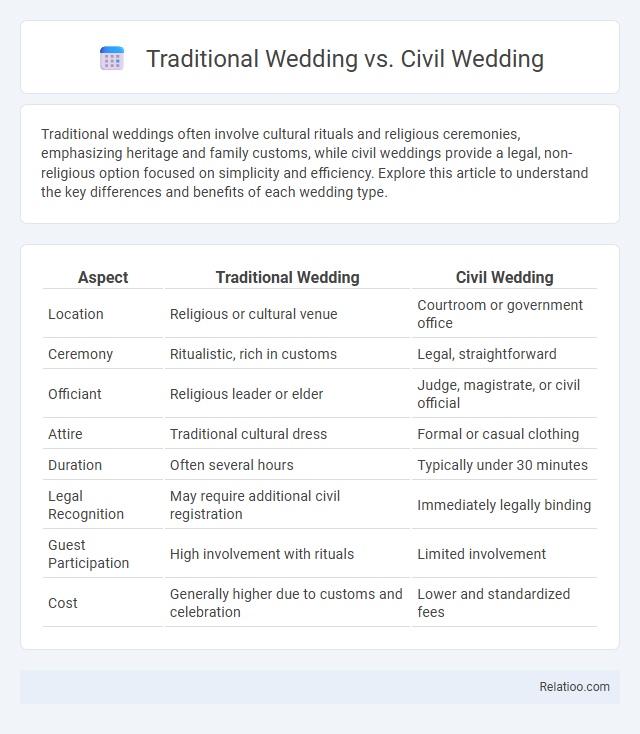Traditional weddings often involve cultural rituals and religious ceremonies, emphasizing heritage and family customs, while civil weddings provide a legal, non-religious option focused on simplicity and efficiency. Explore this article to understand the key differences and benefits of each wedding type.
Table of Comparison
| Aspect | Traditional Wedding | Civil Wedding |
|---|---|---|
| Location | Religious or cultural venue | Courtroom or government office |
| Ceremony | Ritualistic, rich in customs | Legal, straightforward |
| Officiant | Religious leader or elder | Judge, magistrate, or civil official |
| Attire | Traditional cultural dress | Formal or casual clothing |
| Duration | Often several hours | Typically under 30 minutes |
| Legal Recognition | May require additional civil registration | Immediately legally binding |
| Guest Participation | High involvement with rituals | Limited involvement |
| Cost | Generally higher due to customs and celebration | Lower and standardized fees |
Understanding Traditional Weddings
Traditional weddings often reflect cultural heritage and religious customs, incorporating rituals passed down through generations to symbolize union and community acceptance. These ceremonies frequently involve extensive attire, specific rites, and celebrations that emphasize family roles and cultural identity. Understanding traditional weddings requires recognizing their deep-rooted significance beyond legal formalities, contrasting with civil weddings that prioritize legal recognition and simpler ceremonies.
What is a Civil Wedding?
A civil wedding is a legally recognized marriage conducted by a government official or civil authority rather than a religious figure, often held in a courthouse or a designated public venue. It focuses solely on the legal aspects of marriage without incorporating religious customs or rituals, making it a straightforward option for couples seeking a non-religious union. Civil weddings are recognized by the state and provide the same legal rights and responsibilities as traditional religious ceremonies.
Cultural Significance of Traditional Weddings
Traditional weddings hold profound cultural significance by preserving ancestral customs, rituals, and symbolic attire that convey a community's identity and heritage. Unlike civil weddings, which are primarily legal contracts performed by government officials, traditional weddings emphasize deep-rooted spiritual and familial connections celebrated through age-old practices passed down generations. Ceremony types vary, but traditional weddings remain vital in fostering cultural continuity and reinforcing social bonds within specific ethnic or religious groups.
Legal Requirements for Civil Weddings
Civil weddings require a legal process including obtaining a marriage license from the local government office, providing valid identification, and sometimes meeting residency or age requirements. Unlike traditional or religious ceremonies, civil weddings are officiated by a government official or judge and must adhere strictly to state or country-specific laws to be legally recognized. The legal documentation signed during the civil wedding serves as a binding contract, ensuring the marriage is officially recorded in public records.
Rituals and Customs: A Comparative Overview
Traditional weddings often feature rich cultural rituals such as tea ceremonies, henna application, or religious blessings that symbolize familial ties and spiritual unity. Civil weddings prioritize legal formalities with minimal ceremonial customs, focusing on the official signing of marriage documents and public declarations. Ceremonies can blend elements from both, incorporating personalized vows and symbolic acts like unity candles or sand ceremonies to emphasize emotional connection and commitment.
Budget Considerations: Traditional vs Civil
Traditional weddings typically involve higher expenses due to elaborate customs, formal attire, multiple venues, and extensive guest lists, often requiring a substantial budget for catering, decorations, and entertainment. Civil weddings generally offer a more cost-effective alternative with minimal ceremony fees, simpler attire, and reduced guest capacities, making them ideal for couples prioritizing budget efficiency. Comparing costs reveals traditional weddings can exceed $30,000 on average, whereas civil weddings often remain under $5,000, highlighting significant financial differences between the two.
Venue Options for Both Wedding Types
Traditional weddings often take place in religious venues like churches or temples, emphasizing cultural and spiritual significance. Civil weddings typically occur in government buildings, courthouses, or outdoor spaces like parks, offering a more flexible range of venue options. Your choice depends on the desired atmosphere and legal requirements, with each wedding type accommodating diverse locations.
Attire and Dress Codes
Traditional weddings typically feature formal attire reflecting cultural or religious customs, such as wedding gowns, tuxedos, or regional dress with specific symbolic elements. Civil weddings involve simpler dress codes, often leaning towards business casual or semi-formal wear, focusing on modesty and practicality without ceremonial embellishments. Ceremony attire varies widely depending on the event type, with some ceremonies requiring formal outfits while others allow casual or themed dress, emphasizing comfort and personal expression.
Guest List and Invitations
Traditional weddings typically involve a larger guest list, often including extended family and close friends, with formal printed invitations reflecting cultural or religious customs. Civil weddings usually feature a smaller, more intimate guest list, with invitations sent primarily to immediate family and a few close friends, emphasizing simplicity and efficiency. Your choice between these options influences the size and formality of the invitations and the overall ambiance of the celebration.
Choosing the Best Wedding Type for You
Choosing the best wedding type depends on personal values, legal requirements, and desired experiences. Traditional weddings often emphasize cultural rituals and family involvement, while civil weddings provide a simple, legally recognized contract without religious context. Ceremony options allow couples to customize vows and settings, balancing emotional significance with legal formalities to best reflect their individual preferences.

Infographic: Traditional Wedding vs Civil Wedding
 relatioo.com
relatioo.com